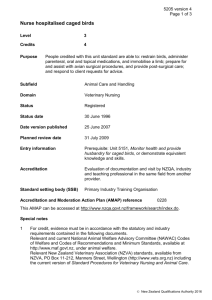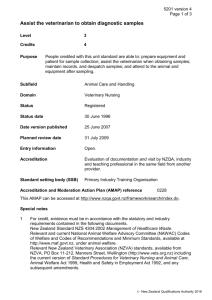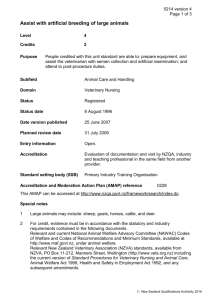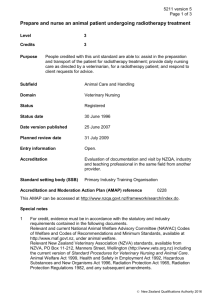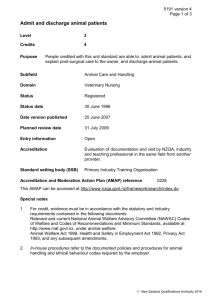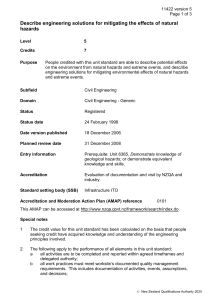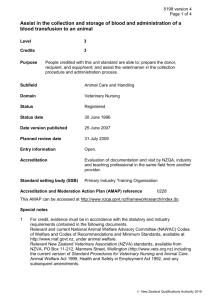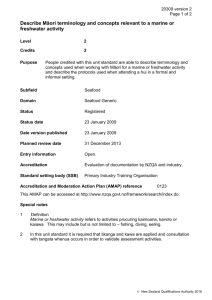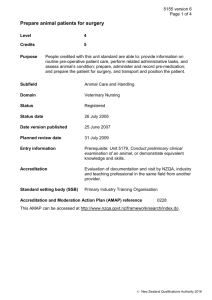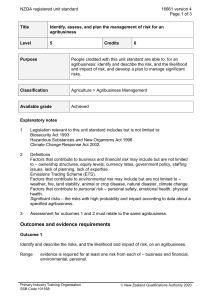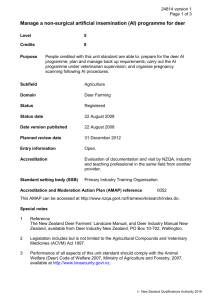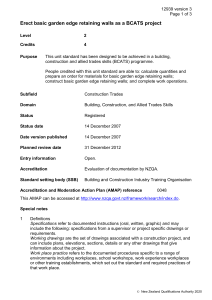5210 Nurse an animal patient undergoing chemotherapy
advertisement
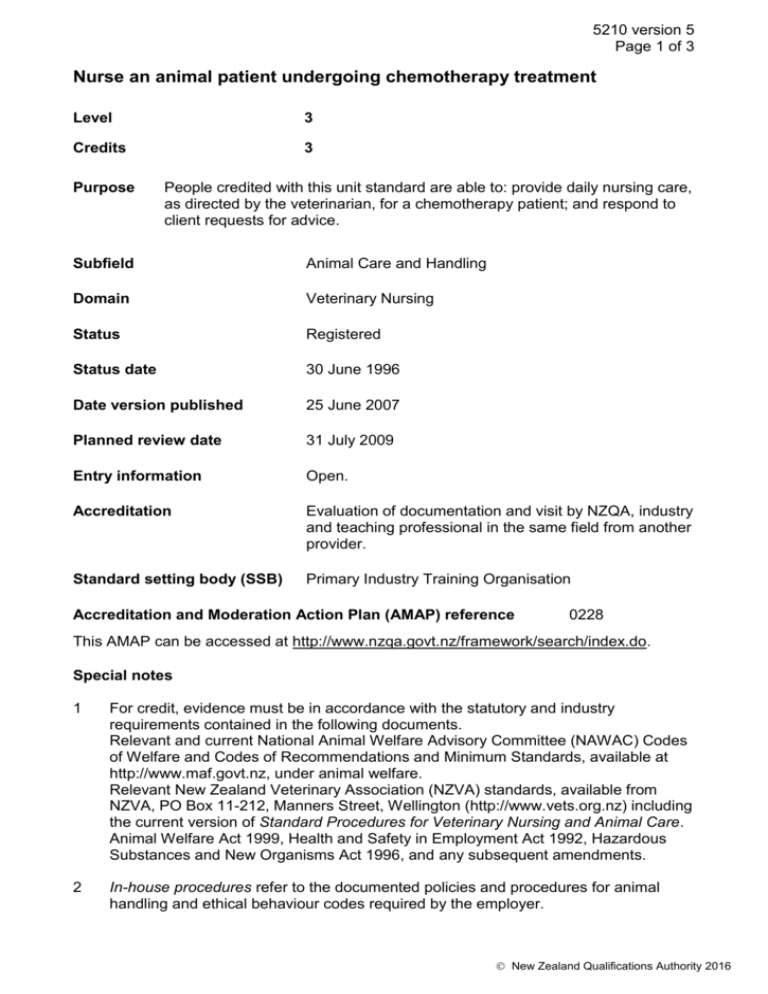
5210 version 5 Page 1 of 3 Nurse an animal patient undergoing chemotherapy treatment Level 3 Credits 3 Purpose People credited with this unit standard are able to: provide daily nursing care, as directed by the veterinarian, for a chemotherapy patient; and respond to client requests for advice. Subfield Animal Care and Handling Domain Veterinary Nursing Status Registered Status date 30 June 1996 Date version published 25 June 2007 Planned review date 31 July 2009 Entry information Open. Accreditation Evaluation of documentation and visit by NZQA, industry and teaching professional in the same field from another provider. Standard setting body (SSB) Primary Industry Training Organisation Accreditation and Moderation Action Plan (AMAP) reference 0228 This AMAP can be accessed at http://www.nzqa.govt.nz/framework/search/index.do. Special notes 1 For credit, evidence must be in accordance with the statutory and industry requirements contained in the following documents. Relevant and current National Animal Welfare Advisory Committee (NAWAC) Codes of Welfare and Codes of Recommendations and Minimum Standards, available at http://www.maf.govt.nz, under animal welfare. Relevant New Zealand Veterinary Association (NZVA) standards, available from NZVA, PO Box 11-212, Manners Street, Wellington (http://www.vets.org.nz) including the current version of Standard Procedures for Veterinary Nursing and Animal Care. Animal Welfare Act 1999, Health and Safety in Employment Act 1992, Hazardous Substances and New Organisms Act 1996, and any subsequent amendments. 2 In-house procedures refer to the documented policies and procedures for animal handling and ethical behaviour codes required by the employer. New Zealand Qualifications Authority 2016 5210 version 5 Page 2 of 3 3 Underpinning Knowledge The following areas of knowledge underpin performance of the elements in this unit standard: Situations where chemotherapy is used Most sensitive tumours responsive to chemotherapy Chemotherapy agents and their toxicity Radioactive iodine safety Safe handling of cytotoxic drugs Contra-indications for staff (pregnancy, hypothyroidism) Hazards, practical solutions, and precautions for managing toxic waste, and for drug administration. Elements and performance criteria Element 1 Provide daily nursing care, as directed by the veterinarian, for a chemotherapy patient. Performance criteria 1.1 Patient is monitored as directed by the veterinarian, and abnormalities are recorded and reported according to in-house procedures. Range catheter site, effects and side effects of treatment, fluid lines, temperature, pulse, respiration, appetite, thirst, urination, defecation. 1.2 Assistance is provided to the veterinarian as directed, using safety precautions to protect self and other personnel from associated hazards. 1.3 Samples are collected as directed by the veterinarian, with safety precautions taken to protect self and other personnel from hazards associated with collecting and handling toxic waste. Range urine, faeces. 1.4 Agents are prepared as directed by the veterinarian, using safety precautions to protect self and other personnel from associated hazards. 1.5 General comfort of patient is maintained according to nature of treatment and hazards to personnel. Range feeding, maintaining bedding, exercise, emotional and environmental enrichment. New Zealand Qualifications Authority 2016 5210 version 5 Page 3 of 3 Element 2 Respond to client requests for advice. Performance criteria 2.1 Advice within the parameters specified by the practice and within the capability of self is provided in a manner which is tactful and at a level of understanding appropriate for the client. Range 2.2 care at home, precautions to be taken, feeding, exercise, care in clinic and reasons, reason for hospitalisation. Need for referral to a specialist is assessed in accordance with veterinary practice procedures. Please note Providers must be accredited by NZQA, or an inter-institutional body with delegated authority for quality assurance, before they can report credits from assessment against unit standards or deliver courses of study leading to that assessment. Industry Training Organisations must be accredited by NZQA before they can register credits from assessment against unit standards. Accredited providers and Industry Training Organisations assessing against unit standards must engage with the moderation system that applies to those standards. Accreditation requirements and an outline of the moderation system that applies to this standard are outlined in the Accreditation and Moderation Action Plan (AMAP). The AMAP also includes useful information about special requirements for organisations wishing to develop education and training programmes, such as minimum qualifications for tutors and assessors, and special resource requirements. Comments on this unit standard Please contact the Primary Industry Training Organisation standards@primaryito.ac.nz if you wish to suggest changes to the content of this unit standard. New Zealand Qualifications Authority 2016
